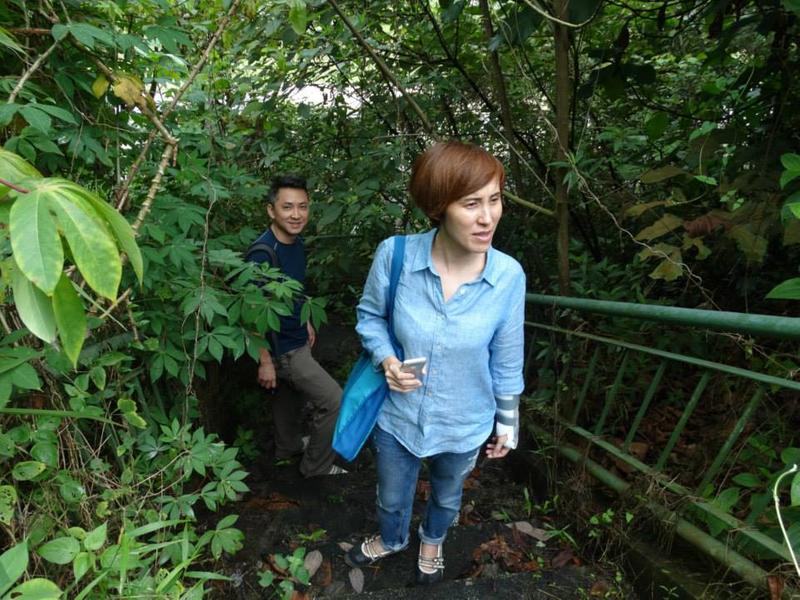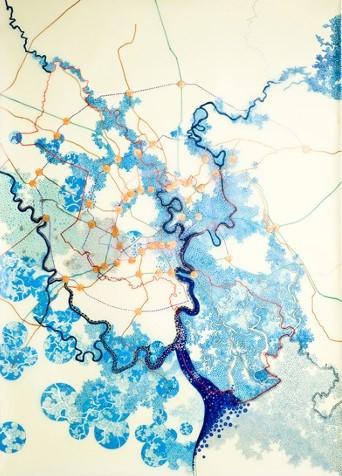The Asian Cultural Council’s model of cultural exchange centers art as both a universal communicator—transcending borders and divides—and as a language unique to and expressive of personal and cultural contexts. With this in mind, ACC organized its first online festival (East West Fest) in spring 2021 with a focus on storytelling. Bringing together storytellers from across the arts, this festival questioned not only how we tell stories, but who tells the story.
“The planning of this festival began in late 2020 with the intent to celebrate Asian/American voices,” explained Stephanie Chen, ACC’s Director of Marketing & Communications, “While the rise of anti-Asian sentiment is not new, increased media coverage of racially motivated attacks highlights the importance of speaking up as a community and taking pride in our multifaceted cultural identities. We are not one voice, but a powerful chorus of intersecting stories.”
The series culminated in ACC's signature public program, East-West Dialogue, a biannual lecture series endowed by longtime supporters Shoji and Tsuneko Sadao that engages leaders from the arts and cultural fields across Asia and the United States. Together, Pulitzer Prize-winning author Viet Thanh Nguyen (ACC 2010) and multidisciplinary artist Tiffany Chung (ACC 2015) reflected on their work around the experience of Vietnamese refugees through the context of personal, historical, and political narratives.
East-West Dialogue with Viet Thanh Nguyen & Tiffany Chung
Viet Thanh Nguyen received an ACC Fellowship in 2010 to research sites of history and memory in Vietnam, while Tiffany Chung’s fellowship in 2015 took her to Hong Kong and Singapore to research former Vietnamese refugee camps. Both explored what was erased, and what still remains. "Because of our own history as refugees from Vietnam and our research interests,” Viet explained, “we have a lot of concerns about refugees, both about how they’re discussed in political and popular discourse, and how they’re represented—or not represented—in the kinds of arts we’re engaged in.”

Viet Thanh Nguyen & Tiffany Chung visiting sites of former refugee camps in Singapore
Much of Tiffany’s work involves visualizing stories through mapmaking. “As a child,” she said, “I experienced the historic flood of the Mekong River in 1978 in the new economic zone, where we were forcibly relocated after the war. I could only write about these memories years later, but the artwork came earlier.”
 In the face of Vietnamese censorship and the omission of refugee narratives from American history, Tiffany works "to depict this politically-driven historical amnesia using abstract forms, yet at the same time...being explicit and comprehensive in mapping memories.” In conducting mapmaking workshops with refugees, Tiffany explained, “maps are a way for them to really tell their own stories without being asked...to map their experience of leaving their home, leaving their countries, but also talking about dreams of wanting to go certain places.” At the same time, she added, “maps are also a colonial tool of power, and you reclaim that power by using maps to tell our own stories.”
In the face of Vietnamese censorship and the omission of refugee narratives from American history, Tiffany works "to depict this politically-driven historical amnesia using abstract forms, yet at the same time...being explicit and comprehensive in mapping memories.” In conducting mapmaking workshops with refugees, Tiffany explained, “maps are a way for them to really tell their own stories without being asked...to map their experience of leaving their home, leaving their countries, but also talking about dreams of wanting to go certain places.” At the same time, she added, “maps are also a colonial tool of power, and you reclaim that power by using maps to tell our own stories.”
Pictured above: Tiffany Chung’s one giant great flood 2050: HCMC existing & planned transport network affected by extreme flood prediction 2050
,%20%E2%80%99Tiffany%20Chung%20Vietnam,%20Past%20is%20Prologue%E2%80%99%20%E2%80%93%20Smithsonian%20American%20Art%20Museum,%202019.jpeg)
reconstructing on exodus history: flight routes from camps and of ODP cases (2017), 'Tiffany Chung: Vietnam, Past is Prologue' – Smithsonian American Art Museum, 2019
Viet similarly writes to counter narratives that “disremember” the Vietnamese experience, noting that while the U.S. “lost the war in fact, it won the war in storytelling.” Part of his work lies in re-casting narratives away from a U.S. and Euro-centric focus. “It was really important in my work,” he says, “to cast the refugee experience as an epic and heroic experience. People who went to sea were terrified, but I think we need to view them as heroes in their own odysseys.”
From his novels, The Sympathizer to The Committed, to his op-ed pieces to his work with the Diasporic Vietnamese Artists Network, Viet centers the voices of those who experience “narrative scarcity.” "Not having stories told about you is both psychologically and culturally damaging,” he explained, “and that is what incited me to become a writer: to tell my story and our stories.” What his work does not do, however, is “give voice to the voiceless." This idea, he explains, “is deeply problematic. We know that Vietnamese are not voiceless. It’s just that we are not heard, and in fact, we are silenced.”
If East West Fest began with the question of how stories are told and who tells those stories, Viet and Tiffany brought us to the crux of why stories must be told. “What we should all be doing,” Viet concluded, “whether it’s institutions like the Asian Cultural Council or we, as artists with some kind of public inclination, is to encourage more voices and abolish the conditions of [seeming] voicelessness." For ACC, this idea is central to public programs like East West Fest and East-West Dialogue. These series both create a platform for a diverse community of artists to speak, and a space for a global audience to listen. We invite you to join us in making these voices heard.
To listen to Viet Thanh Nguyen and Tiffany Chung’s conversation in full and learn more about East West Fest, visit www.asianculturalcouncil.org/eastwestfest.
 ACC New York
ACC New York